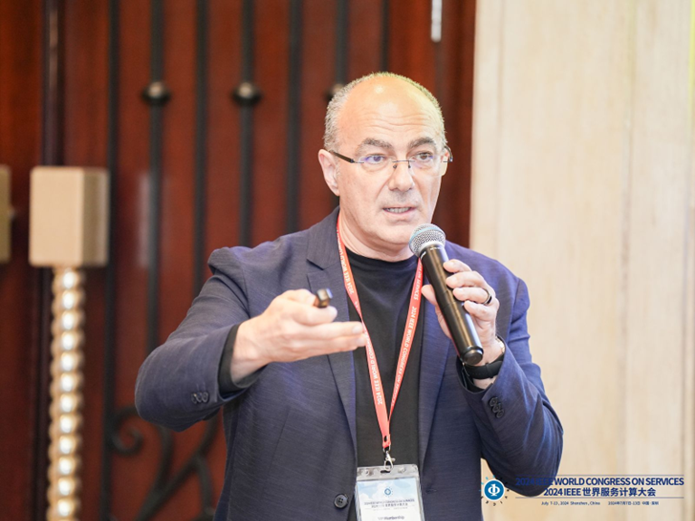Plenary Speaker of 2026

Prof. Laszlo T. Koczy
Professor Emeritus
Budapest University
of Technology and Economics, Hungary
Biography: Dr. h.c. László T. Kóczy has Ph.D. and D.Sc. degrees and is a member of the Polish Academy of Sciences, a Fellow of the International Fuzzy Systems Association, and multiple other scientific societies, he received the Fuzzy Pioneer Award from the IEEE Computational Intelligence Society, etc.
He Is Professor Emeritus at Budapest University of Technology and Economics, he was Dean and President of the University Ph.D. Council at Széchenyi István University (Győr), where he works now part time as a Professor Emeritus, and he is now Full Professor at John von Neumann University (Kecskemét), and is Dean’s Senior Advisor at Pécs University of Sciences.
He has been a visiting professor in various countries in four continents, among others, in Japan, Korea, Australia, Italy and Austria.
He published close to 900 scientific books, journal and conference papers, and received about 10,000 citations to them.
He received the Officer and Commander Crosses of the Order of Hungary.
Keynote Speakers of 2026

Prof. Schahram Dustdar
Member of the Academia Europaea
IEEE
Fellow, EAI Fellow, AAIA Fellow
ACM
Distinguished Scientist
ACM Distinguished
Speaker
AIIA (InternationaI AI Industry
Alliance) president
TU Wien, Austria
Biography: Schahram Dustdar is a Full Professor of Computer Science at the TU Wien, heading the Research Division of Distributed Systems, Austria and part-time ICREA research Professor at UPF Barcelona. He holds several honorary positions: University of California (USC) Los Angeles; Monash University in Melbourne, Shanghai University, Macquarie University in Sydney. From January until June 2017 he was a Visiting Professor at UC Berkeley, USA.
From 1999 – 2007, he worked as the co-founder and chief scientist of Caramba Labs Software AG in Vienna (acquired by ProjectNetWorld AG), a venture capital co-funded software company focused on software for collaborative processes in teams. He is the co-founder and chief scientist of Coovally.ai, an AI infrastructure company based in Barcelona. He serves as Editor-in-Chief of Computing (Springer). Dustdar is the recipient of multiple awards: IEEE TCSVC Outstanding Leadership Award (2018), IEEE TCSC Award for Excellence in Scalable Computing (2019), ACM Distinguished Scientist (2009), ACM Distinguished Speaker (2021), IBM Faculty Award (2012). He is an elected member of the Academia Europaea: The Academy of Europe, as well as an IEEE Fellow(2016) and an Asia-Pacific Artificial Intelligence Association (AAIA) Fellow (2021) and was AAIA president (from 2020-2021).

Prof. Keeley Crockett
SMIEEE
Lead Data and AI Ethics Group /
Lead Machine Intelligence Group
Manchester
Metropolitan University, UK
Biography: Keeley Crockett SMIEEE SFHEA is a Professor in Computational Intelligence at Manchester Metropolitan University She has over 27 years’ experience of research and development in Ethical and responsible AI), computational intelligence algorithms and applications, including adaptive psychological profiling, fuzzy systems, semantic similarity, and dialogue systems. Keeley was a steering committee member for the Policy Connect and UK Parliamentary Inquiry on Skills in the Age of AI. She is one of the five EPSRC Public Engagement Champions and was PI on the EPSRC “PEAs in Pods: Co-production of community based public engagement for data and AI research.” Keeley was one on the Founders of the People Panel for AI, funded by The Alan Turing Institute and adopted in 2024 Manchester City Council. She is the co-academic AI lead at MMU for the UKRI funded Centre for Digital Innovation and is working on several Innovate UK KTPs. Keeley was a collaborator on the AI Playbook for the UK Government and in Sept-2025 co-chaired the AI in Government and Academia Summit. She is part of the International Agentic AI Safety Experts Focus Group which includes the development of the Guidelines for Agentic AI Safety Volume 1&2 (2024, 2025). Keeley Chairs the UKRI’s AI & Robotics Strategic Advisory Team. She founded the IEEE Technical committee SHIELD (2022-2024) and currently Chairs the new IEEE CIS AI Ethics Education and Awareness Taskforce.